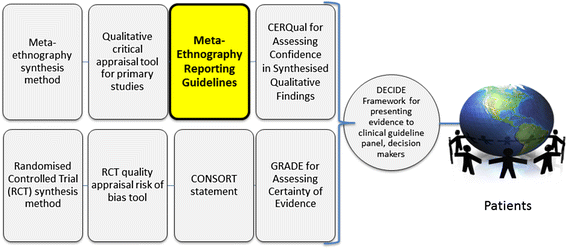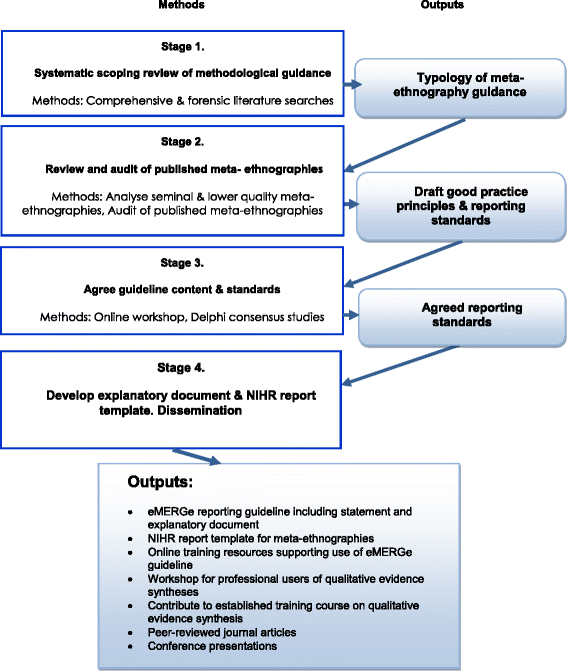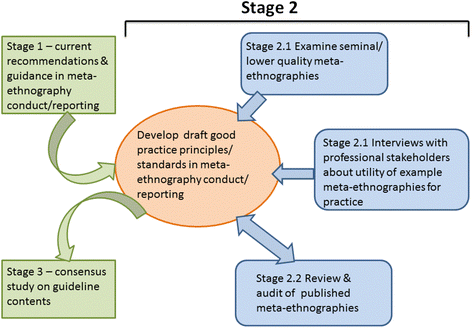Protocol-developing meta-ethnography reporting guidelines (eMERGe)
- PMID: 26606922
- PMCID: PMC4660777
- DOI: 10.1186/s12874-015-0068-0
Protocol-developing meta-ethnography reporting guidelines (eMERGe)
Abstract
Background: Designing and implementing high-quality health care services and interventions requires robustly synthesised evidence. Syntheses of qualitative research studies can provide evidence of patients' experiences of health conditions; intervention feasibility, appropriateness and acceptability to patients; and advance understanding of health care issues. The unique, interpretive, theory-based meta-ethnography synthesis approach is suited to conveying patients' views and developing theory to inform service design and delivery. However, meta-ethnography reporting is often poor quality, which discourages trust in, and use of, meta-ethnography findings. Users of evidence syntheses require reports that clearly articulate analytical processes and findings. Tailored research reporting guidelines can raise reporting standards but none exists for meta-ethnography. This study aims to create an evidence-based meta-ethnography reporting guideline articulating the methodological standards and depth of reporting required to improve reporting quality.
Methods/design: The mixed-methods design of this National Institute of Health Research-funded study (http://www.stir.ac.uk/emerge/) follows good practice in research reporting guideline development comprising: (1) a methodological systematic review (PROSPERO registration: CRD42015024709) to identify recommendations and guidance in conducting/reporting meta-ethnography; (2) a review and audit of published meta-ethnographies to identify good practice principles and develop standards in conduct/reporting; (3) an online workshop and Delphi studies to agree guideline content with 45 international qualitative synthesis experts and 45 other stakeholders including patients; (4) development and wide dissemination of the guideline and its accompanying detailed explanatory document, a report template for National Institute of Health Research commissioned meta-ethnographies, and training materials on guideline use.
Discussion: Meta-ethnography, devised in the field of education, is now used widely in other disciplines. Methodological advances relevant to meta-ethnography conduct exist. The extent of discipline-specific adaptations of meta-ethnography and the fit of any adaptions with the underpinning philosophy of meta-ethnography require investigation. Well-reported meta-ethnography findings could inform clinical decision-making. A bespoke meta-ethnography reporting guideline is needed to improve reporting quality, but to be effective potential users must know it exists, trust it and use it. Therefore, a rigorous study has been designed to develop and promote a guideline. By raising reporting quality, the guideline will maximise the likelihood that high-quality meta-ethnographies will contribute robust evidence to improve health care and patient outcomes.
Figures





References
-
- Department of Health. 2010 to 2015 government policy: research and innovation in health and social care. 2015; Available at: www.gov.uk/government/policies/increasing-research-and-innovation-in-hea.... Accessed August 12, 2015.
-
- NICE . CG138 Patient experience in adult NHS services: NICE guideline. NICE: clinical guideline 138; 2012.
-
- Department of Health: Equity and excellence: liberating the NHS. The Stationery Office Limited: UK. July 2010.
-
- Pearson A, Wiechula R, Lockwood C. The JBI model of evidence-based healthcare. Int J Evidence-Based Healthcare. 2005;3(8):207–15. - PubMed
Publication types
MeSH terms
Grants and funding
LinkOut - more resources
Full Text Sources
Other Literature Sources

